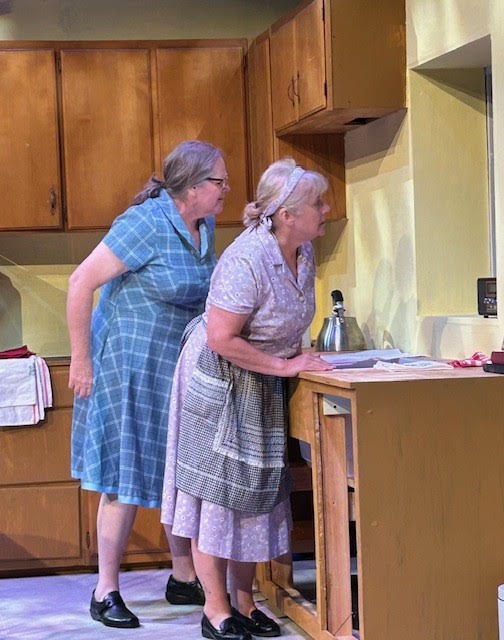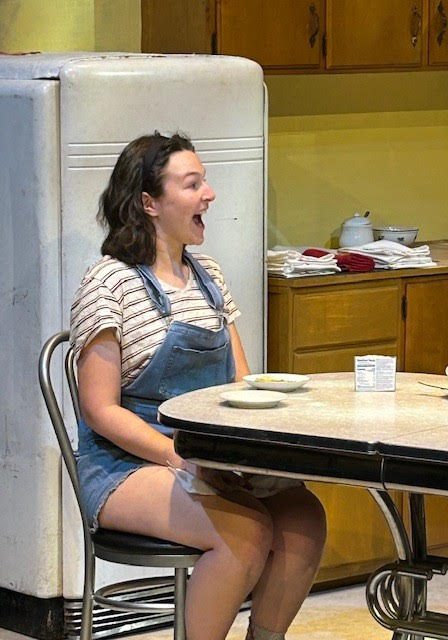It is clear to comprehend why Julie Jensen’s outstanding body of plays have earned her the honor of being Utah’s most widely produced playwright in and out of state. With her exceptional instincts for word economy and layering wholly credible emotional profiles for her characters, Jensen’s plays evoke Utah’s geography while conveying epiphanies that are equally comprehensible to audiences in cities or small towns elsewhere, including New York City and London.
Opening PYGmalion Theatre Company’s new season, Jensen’s award-winning Tender Hooks is a jewel of chamber theater, which showcases all of her aforementioned literary strengths. Directed by Fran Pruyn, the production, with sensitive and fine acting across the board, is surprisingly gentle and comforting, considering the beautifully crafted understatement of a dramatic takeaway which is acutely relevant in the current turbulent sociopolitical climate.

Set in a small rural town much like Jensen’s own birthplace of Beaver, Utah, the play opens with La Priel (pronounced La PREEL), a fastidious woman in her mid-sixties who seems comfortable enough in her modest and immaculately kept kitchen, chatting with her older sister, Margery, who is always willing to dispense nuggets of folk wisdom. La Priel (played with wise, judicious emotional contours by Jensie Anderson) tells Margery (Jane Huefner) how skittish and concerned she is about her new next-door neighbors. The rural town setting is notable: La Priel is certainly of modest means; her income comes as a piano teacher. Nevertheless, she is aghast that her new very noisy neighbors — a family with five children — have not put up any proper curtains on their window.
The kitchen table conversation between La Priel and Margery speaks volumes. Amidst background noise suggesting the kids are playing raucously like any youngsters on a sunny, hot day would, La Priel notes that some of the kids are missing fingers, toes and at least one appears to be missing an ear. “Strangest collection of kids you ever seen,” she tells Margery. When she tells her sister that one of the other neighbors believe they might be “Jehovah Witness or Seven Day Advents,” Margery says it proves why they don’t believe in windows, adding that she is unsure about which one doesn’t believe in professional medicine. Apparently, the family moved to Utah from California, carting everything in an old truck, which La Priel suspects might have been stolen and she does not think they look “like a Californian. Not the ones I seen.”

Photo Credit: Barb Gandy.
Of course, Margery has an explanation for every possibility: “Curtains one of the last things come to mind with them kind.” When La Priel mentions that Letha (who has only three fingers), who visits her regularly, calls the man who moved with them ‘uncle,’ Margery is sure they must be ‘pligs’ (polygamists), because of in-breeding and who seem to be taking over all of the small towns in the area. La Priel seems even more nervous: “Terrible thought, pligs getting their start right here. In this neighborhood, in this street.” Yet, La Priel thinks they can’t be that bad because they seem to be always happy and smiling.
Tender Hooks, a title which is Julie’s marvelous bit of wordplay on ‘tenterhooks,’ moves at a casual, but still breezy pace. The exposition nicely sets up the remainder of the 65-minute play, which is dominated by Letha, the oldest child of the family (with Addie Bowler capturing precisely the confident, carefree, jovial essence of a barefooted girl just about to turn 12) and Mrs. Hicks, her mother (wonderfully interpreted by Brenda Hattingh). La Priel is bemused and curious about how happy Letha seems to be. A box of Jell-O powder is perfect candy for her. Letha prides herself on being just as smart as her mother. “I got all my brains from her. And that’s lucky. Cuz it could of been a lots worst. That’s what Ma says.”
One could have expected Margery’s assumptions about her sister’s new neighbors would have made La Priel that much more apprehensive. But, as the play progresses, La Priel gradually lets her guard down every time Letha bounces into her kitchen, even when Letha talks about taking piano lessons with her. By late in the play, one of Jensen’s trademark expert scenes of subtle dramatic climax provides the strongest acting performance in the production, as La Priel discovers something very significant she can relate directly to, as revealed in her conversation with Letha’s mother.

That scene shifts our perception of La Priel. Everything in her life has been scrupulously neat and well ordered, in a routine that is as oddly protective to the point of vigilance as it is to ensuring her homespun comfort. But, there also is an underlying eloquence to her social loneliness. La Priel’s favorite song is Ah, Sweet Mystery of Life, from a Victor Herbert operetta made famous in a 1935 film version, starring Jeanette MacDonald and Nelson Eddy. In plainest terms, despite its utter sentimentality, the song is about finding out that love is the secret to comprehending everything we fear about life and letting go of the apprehensions we have allowed to restrain ourselves from companionship, community and compassion.
As Jensen has explained, Tender Hooks is about class. It also is about fear of the stranger and the temptation to let the assumption of others shadow our perceptions of those who come from much different backgrounds and become our neighbors. It is a mature and refreshing counterpoint to the inhumane histrionics we have seen recently, for example, in the demonizing of Haitian immigrants in Springfield, Ohio, during this year’s presidential campaign. Often, in surprising ways, when we finally let the shields down that we did not need in the first place, like La Priel, we learn something that can set up an emotionally enriching bond between people from different circumstances, classes and backgrounds.
Likewise, Allen Smith’s set design aptly portrays the thematic contrasts and tensions which drive the narrative, augmenting the inherent nuances of Jensen’s script.

Jensen’s play has evolved from its genesis more than 30 years ago. It was developed at Ossabaw Island Artists’ Colony in Ossabaw, Georgia. An earlier one-act version, Old Wives Tale, was produced by the Women’s Project in New York and the Theatre of NOTE in Los Angeles. The fuller version of the play, with its current title, has had two professional staged readings, one by Patchett-Kaufman Entertainment in Los Angeles and one by The Utah Shakespeare Festival in Cedar City. Jensen said that the current version of the play “owes a debt to Peter Frisch and George Judy, as well as to Fran Pruyn and nine great actors from Salt Lake City.” Tender Hooks also was the winner of the Mill Mountain Playwriting Award, out of Roanoke, Virginia – the third Jensen play to receive this honor (along with Two-Headed: A Play of History and Last Lists of My Mad Mother).
The production continues through Oct. 19. For tickets and more information, see the PYGmalion Productions Theatre Company website.

